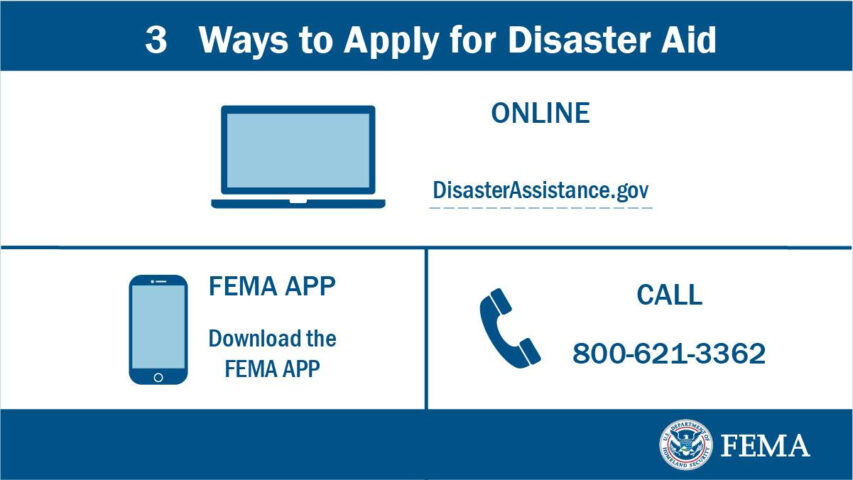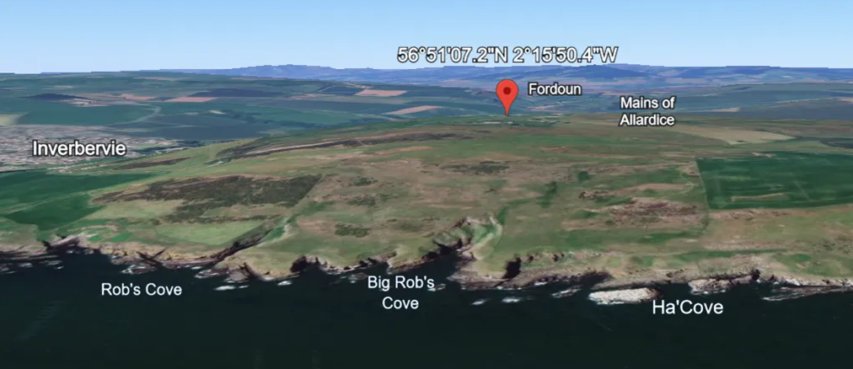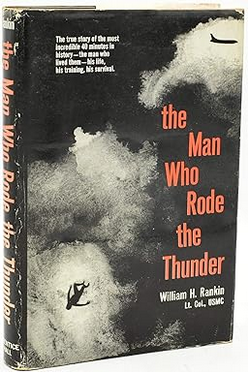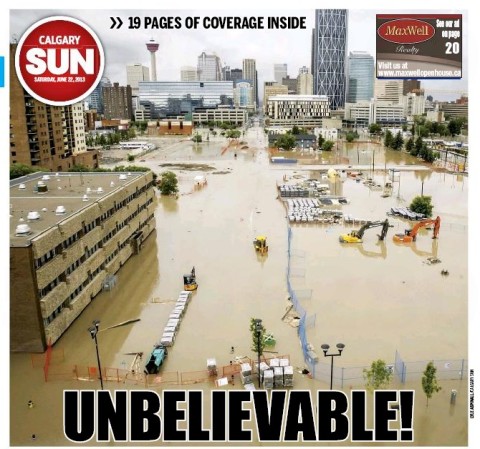Real Time History
Published 18 Oct 2024November 1939. Germany and the Soviet Union have conquered Poland, and Germany is at war with France and Britain. Moscow is free to do as it pleases in Eastern Europe and sets its sights on Finland – but the Winter War will be a nasty surprise for Stalin.
Corrections:
02:19 The dot marking Leningrad is about 80km too far east, it’s of course directly at the far eastern end of the Gulf of Finland.
(more…)
March 7, 2025
Soviet Invasion of Finland: Winter War 1939-40
February 26, 2025
The Korean War 036 – MacArthur Gets Dumber Every Week – February 25, 1951
The Korean War by Indy Neidell
Published 25 Feb 2025Operation Killer begins this week, and its objective is what the name implies, to destroy as much of the enemy as possible rather than just trying to merely take territory. But once again, UN Commander Douglas MacArthur threatens to telegraph it before it starts. The offensive itself, though, is stymied its first few days by the weather. Meanwhile in China, Peng Dehuai meets with Mao Zedong to clear the air.
(more…)
February 12, 2025
Electric vehicles and cold Canadian weather
The Canadian government has been a noisy proponent for Canadians replacing their internal combustion vehicles with electric-powered alternatives, but unlike places like California it gets cold in Canada … very cold indeed at times. The CAA conducted some tests on popular EVs to find out how typical cold conditions impact the range of the cars:
CAA is out with the results from their first ever road tests of how electric vehicles (EV) charge and perform in a Canadian winter.
They tested out 14 electric vehicles which included seven of the top 10 sellers in Canada. They were driven from Ottawa to Mont Tremblant and the temperatures during the drive ranged from -7 to -15 degrees Celsius.
Each vehicle was driven until the battery completely died to determine the range in winter conditions. The results were compared to the estimated driving range published by Natural Resources Canada. CAA says officially posted EV ranges (below) in Canada are based on overall, year-round numbers.
“CAA is responding to a top concern of Canadians when it comes to EVs,” said Ian Jack, vice-president, public affairs, CAA National. “We measured the effective range of electric vehicles in cold weather and how quickly they charge. These insights are critical for both current EV owners and those considering making the switch.”
The association says a recent poll revealed more than two-thirds of Canadians say the drop in driving range during winter is the top barrier to purchasing an EV. Out of those who own an EV, 65 per cent said they experienced a lower battery range in extreme cold weather.
The rest results showed the vehicles drove 14 to 39 per cent less than their official range.
“The vast difference in results really highlights the importance in truth and advertising when it comes to EV range and making sure that Canadians are comparing numbers when it comes to winter performance,” said Kristine D’Arbelles, Senior Director of Public Affairs for CAA National.
January 19, 2025
California’s wildfire plight
Theophilus Chilton on the end of California dreamin’:
Southern California has had a REALLY rough week. Wildfires, started by arsonists and driven by the Santa Ana winds, have burned thousands of acres in the city and county of Los Angeles and destroyed over $150 billion worth of property (and counting). As I write this, the fires still burn and largely remain uncontained, even as new blazes break out. It is a disaster of epic proportions, striking one of the richest and most economically and culturally relevant portions of the country.
Never ones to let a crisis go to waste, the Left responded to this disaster by … focusing on climate change. Not empty fire hydrants, not drained reservoirs, not incompetent leadership, but climate change. These fires, we have been breathlessly assured, are the result of ever-worsening climatic conditions in the region, drying it out and making it susceptible to this kind of affliction. Never mind that observers since Spanish times consistently noted the same kind of weather conditions and hazards that we see today, which suggests that maybe things aren’t actually changing all that much. Of course, those who are blaming climate change fail to recognise the fundamentally chaotic, nonlinear nature of the Earth’s biosphere and the interactions of its constituent parts, something governed by complexity (in the chaos/complexity theory sense of the term). As a result, it’s somewhat foolish to try to draw a direct, causal link between two variables (such as atmospheric CO2 content and temperature) which depend upon nonlinear interactions with hundreds of other factors. Thankfully, they don’t seem to be getting much traction with this.
So what did create the conditions that burned down Los Angeles?
First of all, there was the implementation of a number of policies driven by the state’s radical environmentalist lobby. Thanks to the fanatics, common sense policies that would help to mitigate the region’s inherent fire hazard went undone. Regular controlled burns of underbrush are a standard conservation technique in dry areas that help to thin out brush and prevent wildfires from getting out of control. Building a sufficient number of desalination plants is a good way for coastal desert areas to provide themselves with abundant fresh water for things like drinking, watering crops, filling reservoirs, and fighting fires. In fact, filling reservoirs for future needs would make a lot of sense. But all of these things are “unnatural” and might have “negative impacts” on local wildlife and whatnot.
Another contributory issue is the state’s policies towards the chronically homeless and its de facto sanctuary status for illegal aliens. The Reagan-era deinstitutionalisation of the homeless has been a nationwide disaster for years and California’s particular policies have made the situation in their state even worse. For decades, California has regularly seen wildfires caused by untended campfires started by homeless junkies getting out of control, which the state’s liberal approach to its indigent population has only made more prevalent. Likewise, California’s harbouring of illegal aliens has created a situation in which the state is flooded with masses of hostile foreign elements, some of whom have been caught starting fires all around the LA basin and creating the current catastrophe.
Then there is the fact that California has systematically implemented a set of DEI policies for its governmental workers, including its firefighters. As a result, the state’s leadership in the relevant departments is very good at “promoting inclusion,” but not so good at dealing competently with emergencies when they take place. Indeed, Los Angeles’ mayor Karen Bass and LAFD Chief Kristen Crowley presided over budget cuts for the city’s firefighting capabilities while adding layers of “diversity and inclusion” bureaucracy aimed at systematically de-white-maleing the department and depriving it of the demographic most prone to self-sacrifice and overall technical competence. That reflects trends across the board in which the state and the city have regularly spent more on gay choirs and social justice artwork than they have on necessary functions of government.
November 20, 2024
The Korean War Week 22 – Winter is Coming! – November 19, 1950
The Korean War by Indy Neidell
Published 19 Nov 2024Eighth Army commander Walton Walker makes his final preparations for the big push north to the Yalu River. The Communist Chinese prepare their own forces and wait for the Americans to make their move. At the same time, the freezing Korean winter arrives in force, plunging temperatures well below freezing. The Americans must get this done, and soon.
(more…)
October 5, 2024
Scary words of 2024 – “Luckily, FEMA is on the case”
As I recounted a few days back, I was relieved to hear from my friend in the Asheville NC area after the region absorbed the damage from Hurricane Helene. Tom Knighton had a similar experience:
A friend of mine lives at the edge of where Helene did her worst. He just got power back on yesterday and was finally able to let me know he was OK. I was worried for obvious reasons.
In the deepest, worst parts of where the storm ripped things to shreds, they’re trying to just make it to the next day. They’re struggling to find clean drinking water, food, shelter, the works.
Luckily, FEMA is on the case.
They took to social media yesterday and posted this crap.
That’s right. People who don’t have internet, phone service, or electricity should call, download an app, or log onto the FEMA website.
I won’t ask how stupid can the federal government be, but I’m worried they’d take it as a challenge.
Back in the day, FEMA would roll into a disaster area with paper applications and facilitate all of that right there. While the internet and smartphones are glorious things, this is a prime example of when they’re a terrible option for people.
Right now, American citizens are struggling. They’re thankful to be alive and are working their butts off to keep themselves alive. They’ve paid taxes their entire lives, and now that they need some of theirs back, their federal government is telling them to do what is physically impossible for many of them.
I can’t help but see this and think that their claims of having enough money in spite of spending hundreds of billions on illegal immigrants ring a tad hollow.
If they have the money, why not put boots on the ground getting people signed up for any assistance they may be entitled to?
Honestly, while I’ve commented before about the gross incompetence of the government in disaster response — and I’ll agree that maliciousness is most definitely a possibility, if not a probability in these instances — this is just weapons-grade … whatever, be it stupidity, meanness, or a combination of both.
Heads should roll.
Update: David Warren notes that it’s not merely FEMA incompetence, it’s active deterrence for private relief efforts by all federal agencies.
From the Internet (for instance updates from Elon Musk), we note that non-governmental charitable efforts are not merely “discouraged”. The government is seizing and impounding desperately-needed local goods and services. The rest of the federal bureaucracy is also “chipping in”, to stifle relief efforts. The FAA, for instance, is restricting private aircraft with supplies, and making it almost impossible to fly drones, demanding that flights be individually approved by their slothful trolls. Those who wish to bring help to the survivors have both the wreckage of the storm, and government agents to block them.
This is how things work in this world, and have worked, since the Reformation, when the state took over welfare, hospitals, schools, and all other eleemosynary institutions. Rather than allow inspiring expressions of Christian charity, they became the means for cynical political posturing and control. And with “democracy”, we have detailed laws and policies, to prevent the people from helping themselves — as they would do, by laws of nature.
October 1, 2024
Devastation in the Carolinas
My oldest friend moved to the United States many years ago, moving around the country as his job dictated, but a few years back he and his wife found their perfect house near Asheville, NC. We had emailed to see how they were doing, but got no answer. Yesterday, I got a call from my friend’s cell phone to say that he and his wife were fine and they’d taken in an elderly neighbour until things get back to normal, but they currently don’t have electricity, land line telephone, or municipal water, but they’re otherwise fine. Their house is well above flood level, and he has sufficient camping supplies to keep them going for a while. He loaned his chainsaw to another neighbour who was trying to organize work parties to cut away fallen trees and branches and get more of the local roads open again (my friend recently had lyme disease and doesn’t want to trust his hands doing something as risky as running a chainsaw). We kept the call as short as possible, as he’ll have to manually recharge his phone until power is restored.
Virginia Postrel is originally from that same area of western North Carolina and northwestern South Carolina and reports on how her family in the area is doing in the aftermath of Hurricane Helene:
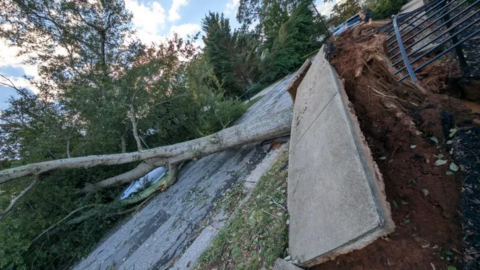
One of the many examples of the “horizontal forest” on nearly every road in Greenville, SC.
Photo by Virginia’s brother Sam M. Inman IV.
If you read my autobiographical reminiscences, you may have realized that I have family in Upstate South Carolina and western North Carolina, which have been hit hard by the unexpected ferocity of Hurricane Helene. Power has been out in Greenville, SC, for days and roads are nearly impassable because of downed trees on nearly every block.
My brother Sam, who went out in a truck on Friday to buy gasoline for his generator, said only about half the stations that had working pumps and were running out of gas quickly. “Lines of cars around the block … reminiscent of the 1970s”, he texted. He went out again today and found a stark difference between local QuikTrip stations and others. At QT, the lines were longer but flowed faster because stations had closed all but a single entrance and exit. Elsewhere, stations were chaotic traffic jams. At one point, he found himself unable to exit after fueling up because the cars behind and in front of him left no to maneuver room. (He persuaded the one behind him to ease away from his bumper.)
The assisted living place where my mother lives has a generator and at first continued to operate its kitchen and elevators. By today, however, the generator had become unreliable, the lights were flickering, few employees could get to work, and the kitchen was offering dry Cheerios for breakfast. Sam brought our mom to his house, which has no power. He later realized that he needed to return to get her medicine, which usually is delivered daily. I can only imagine how residents who don’t have local family — or who are in the memory care wing! — are managing.
Even people who were prepared with generators, many bought after a blizzard 20 years ago, needed gasoline to power them and, they soon realized, adapters to connect them to household appliances. The adapter aisle at Home Depot was quickly depleted.
The good news is that food is available. Grocery stores are operating more or less as normal, assuming you can get to them. When you sell frozen food, you apparently install large, reliable generators.
Meanwhile, my cousin in Asheville finally got weak cell signal back today. We’d been unable to communicate with her before now. With her husband, pets, and 95-year-old mother, she’s evacuating to Winston-Salem through the weekend, hoping Duke Power will live up to promises that power will be restored by Friday but preparing in case it takes a few days longer.
Although terrible in some areas, the flooding isn’t as bad as it might be, thanks to the region’s many man-made lakes. They absorbed water that otherwise would have flowed into populated towns.
September 6, 2024
Climate catastrophism in a phrase – “The sky gods are angry and we’re all gonna pay”
Relax, weather-panic true believers — this is a post from Jim Treacher who gets paid to write funny stuff. This means you can mock everything in it as “fake news”:
I’m pretty old at this point, and for my whole life, the media has been predicting the weather will kill us all.
When I was a kid, the news was all about the coming Ice Age.
Brrrrr! Iran was a bunch of terrorist assholes even back in the ’70s, but the existential threat to America hadn’t been updated yet. They thought the cold was gonna get us.
And that dumb magazine was only $1.25 an issue! Everything might be more expensive 45 years later, but at least we haven’t all frozen to death.
Then the big threat became “global warming”. But when people noticed it wasn’t getting any warmer outside, despite the climate models that were supposed to horrify us, the scare tactic became “climate change”. They didn’t think we’d notice, I guess.
And through it all, there was one constant refrain: The sky gods are angry and we’re all gonna pay.
Do you leave your phone charger plugged in when you’re not using it? Do you drive a gas-powered car because it actually works? Then you’re destroying the planet, according to a pack of millionaires with yachts and private jets.
But now the celebrities and other climate supplicants are in dismay. The weather is letting them down again! Yet another of their predictions hasn’t come true, and they want to know why their climate deities have abandoned them.
Halfway through an Atlantic hurricane season that forecasters expected would be one of the most active on record, there has been a considerable interlude in storms during what is typically the busiest portion of the season, leaving observers to wonder if the forecast was a bust — or if the worst may be yet to come.
Often, at this time of the year, it isn’t uncommon to see two, three or even four named storms occurring simultaneously. But on Wednesday there were no current storms, and there hasn’t been one since Hurricane Ernesto formed, beginning as a tropical storm, on Aug. 12 …
Despite the reprieve in recent weeks, though, “it is too early to dismiss the seasonal hurricane outlook as a bust,” said Dan Harnos, a meteorologist at the NOAA Climate Prediction Center.
You got that? We haven’t endured as many deadly, destructive hurricanes as the scientists predicted. And they’re worried about it. They want people to suffer and die, but they’re hopeful that nature will still unleash its fury on us.
There’s still time for the worst to happen. Fingers crossed!
January 13, 2024
It’s not lying lying
Paul Homewood on how Brits are propagandized through slanted reporting on the weather (which has always been a topic of interest in the British Isles):
Storm Gerrit arrived the day after Boxing Day, accompanied by the usual headlines: “85mph gales barrelled down on Britain”, screamed the Daily Mail.
As usual the public were being deliberately deceived. The 85mph claim was based on one site in North East Scotland, at the top of a 400ft cliff overlooking the North Sea, marked in red below.
A few miles away at sea level average wind speeds never got above 30mph. The Met Office never reports any of this, preferring to publish its favourite sites on clifftops or halfway up mountains.
It was the same story a week later, when another system of low pressure came along to be given yet another silly name, “Henk”.
“94mph winds pummel the UK”, shrieked the Mirror. This time the wind speeds were measured on the Met Office’s go-to weather station, the Needles, off the Isle of Wight. As this column has discussed before, the Needles sit at the end of a long, narrow peninsula, and the station is on top of a 260ft cliff. Winds there are routinely 30mph higher than even exposed sites nearby, such as St Catherine’s Point. Meanwhile average winds inland were typically around 30mph.
It rained as well last week! During the two days of Storm Henk, about an inch fell in parts of southern and central England. There is nothing at all unusual about this amount; it is the sort of thing which happens every year. Because the ground was already saturated, following wet weather last month, there was inevitably some flooding. But, for the most part, this was little more than flooded fields, overflowing river banks and localised flooding. Again, normal scenes in England. And as Patrick Benham-Crosswell pointed out in TCW this week, many houses built on flood plains were once again flooded. There was certainly none of the major river flooding which has hit the country many times in the past.
According to the Environment Agency, about 2,000 properties were flooded, a tragedy for everybody involved. But in overall terms, this is a tiny number. For instance, 55,000 were flooded in 2007.
Inevitably, the media jumped to blame it all on climate change. According to ITV: “Henk is the eighth named storm to have hit the country this winter and the pattern is likely to continue due to the effects of climate change. ‘This is climate change and the impacts we are seeing,’ the Environment Agency’s Tom Paget added. ‘We are seeing these increasingly wet and blustery winters. We are seeing storm upon storm which is exacerbating the issues’.”
Claims like this explain why the Met Office decided to start giving every low-pressure system a silly name back in 2015. But as it admitted in its State of the UK Climate last year, storms used to be much stronger:
The most recent two decades have seen fewer occurrences of max gust speeds above these thresholds [40, 50, 60 kts] than during the previous decades, particularly comparing the period before and after 2000.
This earlier period [before 2000] also included among the most severe storms experienced in the UK in the observational records including the “Burns Day Storm” of 25 January 1990, the “Boxing Day Storm” of 26 December 1998 and the “Great Storm” of 16 October 1987. Storm Eunice in 2022 was the most severe storm to affect England and Wales since February 2014, but even so, these storms of the 1980s and 1990s were very much more severe.
Nor is there any evidence that December or the autumn last year were unusually wet.
We look like getting a few weeks of cold, dry weather from now on – so expect drought warnings soon!
December 19, 2023
Christmas Message from the Museum – MERRY TANKMAS 2023
Ontario Regiment Museum
Published Dec 17, 2023Merry Christmas from the volunteers and staff of the Ontario Regiment RCAC Museum and our friends at World of Tanks. Please enjoy this festive message and get a look into Santa’s Tank Workshop!
This segment originally aired in the TANKMAS 2023 – LIVE Stream on 8 December 2023. Hosted by The Tank Museum (Bovington), and sponsored by our friends at World of Tanks.
https://worldoftanks.com/en/news/live…Full video and stream can be found on The Tank Museum YouTube channel here:
https://www.youtube.com/live/_5cMsW5Z…Meet our hosts from World of Tanks and Wargaming.net:
Nicholas “The Chieftain” Moran and Cmdr_AFMeet our Executive Director: Jeremy N Blowers AKA Tank_Museum_Guy
Wishing you and yours a Very Merry Christmas, and a safe and Happy Holiday season.
PLAY NOW at www.worldoftanks.com
FREE to play and build your own “Tank Museum” garage.Thank you to Wargaming.net for the video production and sponsorship of this museum centered Christmas streaming event.
December 16, 2023
Do Droughts Make Floods Worse?
Practical Engineering
Published 5 Sept 2023The answer isn’t as simple as you might think!
One statistician famously said, “All models are wrong, but some are useful”. And even something as simple as the flow of water into the soil has so many complexities to keep track of. Like most answers to simple questions in engineering and in life: the answer is that it’s complicated.
(more…)
November 28, 2023
“This was a document from a parallel universe with familiar-sounding people and places, but a totally bizarre worldview and culture”
In the latest addition to Mr. and Mrs. Psmith’s Bookshelf, John Psmith reviews The Man Who Rode the Thunder, by William H. Rankin:
Like many little boys, I loved learning lists of things. One day it was clouds. How could I not love them? The names were fluffy and Latinate, delicate little words like “cumulus” and “cirrus” that sounded like they might float away on a puff of wind. But there was also a structure to the words, intimations and hints of taxonomy. Was the relationship of an altocumulus to an altostratus the same as that of a cirrocumulus to a cirrostratus? I wasn’t sure, but it seemed likely! So here I had not just a heap of words, but something more like a map to making sense of a new part of the world.
So I learned the names of all the clouds, but I quickly got bored of most of them. Only one of them held my attention, but it made up for the rest by becoming an obsession. Yes, it was the mighty cumulonimbus, the towering, violent monster that heralds the approach of a thunderstorm. By then I had already met plenty of them — one of my earliest memories is of huddling with my mother in the room of our house that was farthest from any exterior walls, while lightning struck again and again and again, the echoes of the previous thunderclap still reverberating off the landscape when the next one began. What, I wondered, would it be like to be inside one?
There’s one man who knows. His name is Colonel William H. Rankin, and he fell through a thunderstorm and lived to tell the tale. After his ordeal Rankin published a memoir that was a bestseller in the early ’60s, but is out of print today. If you click the Amazon link at the top of this page, you will see that secondhand copies of the paperback edition go for about $150. If that’s too steep for you, I’m told that
Good Samaritanscommunists have uploaded high-quality scans of the book to various nefarious and America-hating websites, but this is a patriotic Substack and we would never condone that sort of behavior. Be warned!I sought out and read Rankin’s memoir for the part where he falls through a cloud, so I was planning on skimming and/or skipping the hundred or so pages where he narrates his life and career up to that point. When I actually cracked open the
They say you should read books to broaden yourself, to learn about foreign peoples and about cultures not your own. I was unprepared for late 1950s America being as foreign as it turned out to be. There’s a whole genre comprised of parodying the supposed mid-century American combo of sunny faith in scientific progress, squeaky-clean public morality, and blithe indifference to the horrors of industrial warfare. In my own reading and watching, I had only ever encountered the parodies, never the genuine article, until I read this book. Rankin’s memoir exudes gee-whiz enthusiasm from every pore. He is patriotic without a trace of irony, giddy as a schoolboy about advances in jet propulsion, and then uses a totally unchanged tone of giddiness and enthusiasm to describe melting hundreds of Korean peasants with napalm.
Reading this stuff fills me with the same feeling of vertigo that I get reading about Bronze Age Greek warriors — here is a human being just like me, but inhabiting a cultural, spiritual, and memetic universe so different from mine. Are we the same species? If we were to meet each other would we even be able to communicate? Or perhaps every age has had people like him and people like me, and all that’s changed is that the dominant mode of social interaction shifted from favoring one of us to the other. After all, I know people today who are incapable of irony or reflection. For instance, TSA agents. Was 1950s America an entire society of TSA agents? And if so, what am I to make of the fact that in so many ways it seems to have been more functional than America today?
November 8, 2023
QotD: Climate change, sorcerism and magical thinking
Many primitive societies believe that maleficient spirits cause all sorts of human misfortune that in the modern West we have learned to attribute to natural causes – cattle dying, crops failing, disease, drought, that sort of thing. A few societies have developed a more peculiar form of supernaturalism, in which evil spirits recede into the background and all misfortune is caused by the action of maleficient human sorcerers who must be found and rooted out to end the harm.
A society like that may be a grim, paranoid place with everyone constantly on the hunt for sorcerers – but a sorcerer can be punished or killed more easily than a spirit or a blind force of nature. Therein lies the perverse appeal of this sort of belief system, what I’ll call “sorcerism” – you may not be able to stop your cattle from dying, but at least you can find the bastard who did it and hurt him until you feel better. Maybe you can even prevent the next cattle-death. You are not powerless.
[…]
The most puzzling thing about the whole exchange was his insistence on interpreting my talk about the weather as a political move. I report the Central Valley superstorm of 1861-62 and R’s response is “When did you turn into Rush Limbaugh?” Uh, WTF, over?
It took me a while to model the frame of mind that produced this, but when I managed to I had an insight. Which is why I’m writing this essay. I think, now, what I actually threatened was R’s belief that he, or somebody, could do something emotionally satisfying about the bad weather. Fix it, or prevent it from recurring, or at least punish the bastards who did it.
Supernaturalizing the causes of large-scale misfortunes has become a difficult strategy to sustain for anyone with more exposure to modern scientific knowledge than a cinderblock. Politicizing them into someone’s bad juju, however … that’s easy. And, perhaps, more attractive than ever before – because the alternative is to feel powerless, and that is painful.
Science and the increase in our control over our immediate environment at the small scale may, in fact, be driving us back towards a sort of sorcerism by making the feeling of powerlessness more painful. We are children of humanism and the Enlightenment; terror of the storm and dark is something we associate with the bad old days of angry gods. We should be beyond that now … shouldn’t we?
Thus, the politicization of every bad thing that happens. And people like R, for whom “When did you turn into Rush Limbaugh?” becomes a sort of aversive charm to ward off fear of the Central Valley superstorm and its like.
Yes, we need a word for this, too. Not “sorcerism”; “politicism”, perhaps. The insistence on locating for every large-scale problem a human cause that can be addressed through politics and a set of serviceable villains to punish. Also, the insistence that anyone who rejects the politically fashionable explanation must be in league with the evil sorcerers.
Unfortunately, reality isn’t like that. If a supernova goes off within eight parsecs of us and strips off the Earth’s ozone layer it won’t have been Halliburton or the International Communist Conspiracy that did it. And if the Central Valley superstorm does repeat on us – well, statistically that looked pretty likely at a mean interval of about 150 years; welcome to your new normal, and hunting for the evil carbon-or-whatever emitters that did it is highly unlikely to do any more than supplying you with a scapegoat to ease your hurt feelings.
Finally … feeling powerless may suck, but on the whole it’s preferable to sorcerer hunts. People get killed in sorcerer hunts, almost always people who are innocent. One reason I’m not a politicist is that I don’t want to be any part of a howling mob. It’s a form of self-restraint I recommend to others.
Eric S. Raymond, “Heavy weather and bad juju”, Armed and Dangerous, 2011-02-03.
October 3, 2023
QotD: The meteorologically mild 20th century
English needs, I think, a word for “beliefs which are motivated by the terror of being powerless against large threats”. I think I tripped over this in an odd place today, and it makes me wonder if our society may be talking itself into a belief system not essentially different from sorcerism.
[…] I read a lot of history and thus know a fair bit about how weather impact has been perceived by humans over time. It is a fact that the 20th century was an abnormally lucky hundred years, meteorologically speaking. The facts I managed to jam into tweets included (a) the superstorm that flooded 300 square miles of the Central Valley in California in the 1860s, (b) rainfall levels we’d consider drought conditions were normal in the U.S. Midwest before about 1905, and (c) storms of a violence we’d find hard to believe were commonly reported in the 1800s. I had specifically in mind something I learned from the book Wicked River: The Mississippi When It Last Ran Wild, which relays eyewitness accounts of thunderstorms so intense that travelers had to steeple their hands over their noses in order to breathe air instead of water; but a sense that storms of really theatrical violence were once common comes through in many other histories.
We had a quiet century geophysically as well – no earthquakes even nearly as bad as the New Madrid event of 1812, which broke windows as far north as Montreal. And no solar storms to compare with the Carrington Event of 1859, which seriously damaged the then-nascent telegraph infrastructure and if it recurred today would knock out power and telecomms so badly that we’d be years recovering and casualties would number in the hundreds of thousands, possibly the millions.
(I’m concentrating on 19th-century reports because those tended to be well-documented, but earlier records tell us it was the 20th century calm that was unusual, not the 19th-century violence.)
The awkward truth is that there are very large forces in play in the biosphere, and when they wander out of the ranges we’re adapted to, we suffer and die a lot and there really isn’t a great deal we can do about it; we don’t operate at the required energy scales. For that matter, I can think of several astronomical catastrophes that could be lurking just outside our light-cone only to wipe out all multicellular life on Earth next week. Reality is like that.
But none of this would fit in a tweet, so what I said in summary was that this may be the new normal – or, rather, the old normal returning. Humans didn’t do it.
Eric S. Raymond, “Heavy weather and bad juju”, Armed and Dangerous, 2011-02-03.
August 31, 2023
Disaster response plans? I’m sure they’ve established terms of reference for the to-be-appointed blue-ribbon committees to look into that … eventually
In The Line Jen Gerson discovers once again that our federal government is much more interested in making dramatic announcements — usually repeated many, many times — than in actually doing anything. Their response to her inquiry about federal disaster response planning is anything but comforting to worriers among the citizenry:
The clever and devoted readers of The Line will have already surmised that I am a touch neurotic, prone to catastrophize, and gifted with one of those imaginations that is perfectly capable of picturing in vivid detail every worst-case scenario playing out simultaneously.
And so, dear devotee, you will have no trouble picturing my mental state in recent months, in what will come be known as the Summer of Fire. Until next summer, anyway. Until then, it’s always fun to watch two cities burn (or come close to burning) over the course of a single weekend, eh?
Watching the long lines of cars fleeing Yellowknife, or the beachcombers lining the shores of Lake Okanagan as swathes of West Kelowna disappeared, I have to admit that my mind wandered into its darker wings.
Yellowknife and Kelowna are cities, yes, but relatively small ones: Yellowknife is remote and served by only one road, making it a particular logistical challenge to evacuate. But it’s still only a town of 20,000 people. This ought to be well within the capacity of a wealthy, organized G7 country.
What if wildfires threatened, say, Edmonton? A city of a million. How would we get everyone out? Where would they go? What would they eat?
And this line of internal paranoia brought me to the media landing page of the minister of Public Safety Canada. I have questions — to my mind, basic questions — about this country’s capacity to handle major catastrophes. They were as follows:
- What are the transportation resources typically available to facilitate an evacuation: in an emergency, how many people could we move by air or land, and how quickly?
- Does the federal government maintain stores of food or other basic goods? How much? How many people could we feed?
- Do we have the capacity to establish temporary housing for evacuees displaced by an emergency situation? If so, how many people could it hold, and for how long?
I also had a few more general queries. I am aware that they may not have been fully answerable by the federal government, but I was curious about what the response would be. Specifically:
- Are we going to rebuild everything that burns down, or do we have to accept that climate change will make some previously inhabited sections of Canada unlivable?
- What kind of resources will the federal government marshal toward hardening infrastructure to prepare for more serious floods and fires in the future? Is this a priority?
To be clear, none of these questions are “gotchas”. I was not out to catch the federal government by surprise, nor to embarrass it in any way. I don’t think any of these questions is unreasonable; in fact, I expected some fairly stock answers. That is, I expected that a federal government would keep at least a basic running inventory of things like temporary housing or food supplies. Further, I would have been perfectly content with very general answers. Perhaps some of my questions were misguided, and I would have been happy to understand that as well.
What I got was, well, I’m going to show you exactly what I got, offer a little of my own running commentary, and allow you to come to your own conclusions.




